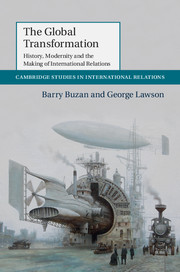Book contents
- Frontmatter
- Dedication
- Contents
- List of Figures
- List of Tables
- Preface
- List of Abbreviations
- Introduction
- Part I The Global Transformation and IR
- Part II The Making of Modern International Relations
- Part III Implications
- 9 From ‘Centred Globalism’ to ‘Decentred Globalism’
- 10 Rethinking International Relations
- Bibliography
- Index
10 - Rethinking International Relations
Published online by Cambridge University Press: 05 February 2015
- Frontmatter
- Dedication
- Contents
- List of Figures
- List of Tables
- Preface
- List of Abbreviations
- Introduction
- Part I The Global Transformation and IR
- Part II The Making of Modern International Relations
- Part III Implications
- 9 From ‘Centred Globalism’ to ‘Decentred Globalism’
- 10 Rethinking International Relations
- Bibliography
- Index
Summary
Introduction
In the nine preceding chapters we have done four things. First, we established the central components and importance of the global transformation (Chapter 1); second, we examined the relative lack of attention paid by IR scholarship to the global transformation (Chapter 2); third, we tracked many of the most important themes and concerns of contemporary IR from their origins in the nineteenth century to the present day. These included:
globalization and the shrinking of the planet (Chapter 3);
the pervasive impact of ideologies of progress (Chapter 4);
the transformation of political units through imperialism, revolution and capitalism (Chapter 5);
the construction of a Western-colonial international society and its development into a Western-global international society (Chapters 6 and 7);
the impact of the global transformation on great power competition, military competition and war (Chapter 8).
Finally, we used the historical framing of the global transformation to rethink aspects of contemporary world politics, paying particular attention to the shift from centred globalism to an international order characterized by decentred globalism (Chapter 9).
We have argued that much of the form and content of contemporary international relations has its origins in the global transformation, and that the nineteenth century is therefore close kin to the twentieth and twenty-first centuries in a way that earlier centuries are not. We are manifestly not saying that everything of importance to IR has its origins in the long nineteenth century. But the configuration of industrialization, the rational state and ideologies of progress not only introduced the main dynamics that underpin modern international relations, it also continues to serve as the basis for many important aspects of contemporary international affairs. The contemporary international order is neither natural nor eternal. It is a historically specific and highly unusual configuration formed in the convulsions of global modernity.
- Type
- Chapter
- Information
- The Global TransformationHistory, Modernity and the Making of International Relations, pp. 305 - 333Publisher: Cambridge University PressPrint publication year: 2015

